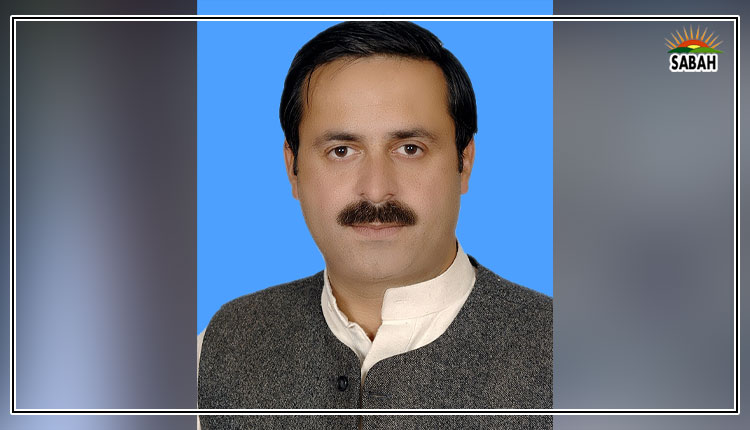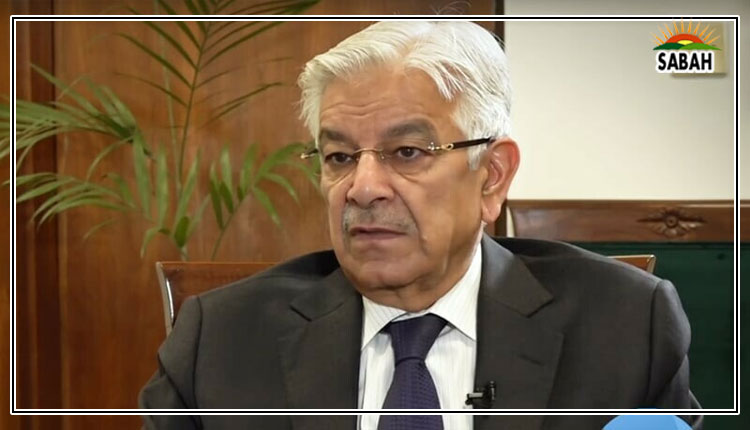Islamabad does not have any problem with US developing a partnership with India if it is not at the cost of Pakistan: Khawaja Asif
ISLAMABAD, June 17 (SABAH): Defence Minister Khawaja Muhammad Asif has said that Islamabad does not have any problem with the United States (US) developing a partnership with India if it is not at the cost of Pakistan.
During in an exclusive interview with American magazine “Newsweek”, the defence minister said, India is a very big market of over 1.3 billion people. “Everywhere in the world, the other big economies will need to have them as partners. But Pakistan is not a very big economy, and [is] a vulnerable economy,” he added.
“All we have is a geographical location, which is strategic, which attracts, I would say, not all the good things, it sometimes attracts some things which really make us even more vulnerable.”
The minister said he personally feels that some appreciation is required in Washington about their situation, and they should not be pushed into a situation where they have to make some very hard choices.
He maintained that Pakistan has common borders with China, Afghanistan, Iran and India, adding, “We would like to have good relationships with them.”
“We would like to improve our relationships with them if the relationship is not good. We want to live in peace,” he added. The minister said that Pakistan gives great value to its ties with the US, adding, “We want that relationship to flourish.”
Terming the incumbent government in New Delhi “Hindu nationalist”, Khawaja Asif said the Indian outlook towards regional politics completely changed since Prime Minister Narendra Modi came into power.
“The secular ideology, which India pursued since 1947, since the subcontinent was divided and we became independent, that was abandoned because of Modi’s politics.”
Lashing out at Indian PM Modi, the minister said, “If you look at his politics in Gujarat, it was again based on anti-minority, it is based on communal tensions and of voting Hindu nationalist support by fanning sentiments against the community, and minorities, both Muslims, Christians, Buddhists, and so many other communities that are very large.”
To another question, the defence minister said that Pakistan’s nuclear capability, or nuclear assets, are not for any jingoistic or hostile intentions.
“So, I think it’s something which underwrites our security, it’s not for any hostile—no, absolutely no, absolutely not. India had become a nuclear power. And we were compelled not to be gobbled by India over the years or over the decades. This is something which underwrites the peace in our region and to a great extent, our security. Otherwise, we have absolutely no intentions. Absolutely no,” he added.
Khawaja Asif maintained that it is a program which is certified by the International Atomic Energy Agency (IAEA) and even as recently as a month back, there was a statement from the IAEA that all the standards—even from the United States—that our program is safe.
“We will not, never, never, ever cross that threshold. That is something that just guarantees our independence,” he added.
Replaying to a question about balancing relationship with the US, China and other regional powers, the minister it has been very difficult for Pakistan over the last many decades to maintain the balancing act with the US and with the regional powers like China, “friends in the Arabian Gulf”, Iran, and, Russia.
“Foreign Secretary [Antony] Blinken is visiting China, let’s hope and pray that things improve between China and United States,” he added.
The minister said that once they have economic stability in the country, we will really be in a better position to handle this situation.
“Our vulnerability, economic vulnerability, actually exposes us to so many problems, which sometimes we are unable to tackle,” said the minister.
The defence minister said that economic instability was one with which they are grappling for quite some time. “And the rest of the instability, whether it is political instability, or civil unrest or terrorist activities elsewhere, that is something we can take care of. That that’s not a problem. And most of the political instability is also an outcome of economic instability. So, this is something which is the outcome of perennial economic instability, which we are facing for last five, six years now,” he said.











